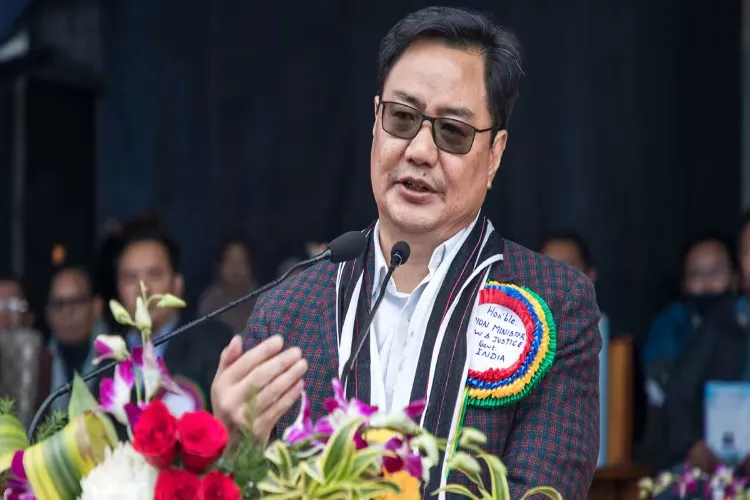
New Delhi
Union Minister of Minority Affairs Kiren Rijiju asserted that the choice of the Dalai Lama's successor should rest solely with the spiritual leader himself, reflecting the belief of his followers worldwide amid China's recent statement on the matter.
"I am a devotee of the Dalai Lama. Anybody in the world who follows the Dalai Lama wants his successor to be chosen by the Dalai Lama himself," Rijiju said.
Emphasising that there should be no ambiguity on the matter, he added, "There is no need for us to be in confusion regarding the Dalai Lama issue. All the people who follow Buddhism as their religion and his followers think that the Dalai Lama should choose his successor on his own. There is no need for us or the Government of India to speak on this."
Refusing to directly address Beijing's remarks, Rijiju said, "I don't want to react on China's statement. The people who follow the Dalai Lama think that he will choose his successor. I am not saying anything on behalf of the Chinese government or Government of India."
Notably, Union Ministers Kiren Rijiju and Rajiv Ranjan will be visiting Dharamshala as representatives of the Government of India to attend the Dalai Lama's 90th birthday on July 6.
Dalai Lama is the spiritual head of Tibetan Buddhism. The current Dalai Lama is the 14th in the lineage.
Meanwhile, Hollywood actor Richard Gere has also joined in celebrations in Dharamshala in Himachal Pradesh ahead of the 90th birthday of the 14th Dalai Lama.
Speaking to reporters, he said, "...Once I went to the Dalai Lama when I was feeling very tired. I asked His Holiness, Can I stop now? He said yes, you can stop when I stop, which is never. This is not a commitment for one lifetime. This is many lifetimes of commitment, not just for Tibet but for the people of Tibet who have been highly abused for many decades by the Chinese Communist party..."
Earlier on July 2, Tibetan Spiritual Leader, the Dalai Lama, stated that the Gaden Phodrang Trust, a foundation established by him, can only recognise future reincarnations, and no one else has the authority to decide on the matter. This statement rules out any say for China in the process of naming the next Dalai Lama.
In a statement on Wednesday, Dalai Lama stated, " The process by which a future Dalai Lama is to be recognized has been clearly established in the 24 September 2011 statement which states that responsibility for doing so will rest exclusively with members of the Gaden Phodrang Trust, the Office of His Holiness the Dalai Lama. They should consult the various heads of the Tibetan Buddhist traditions and the reliable oath-bound Dharma Protectors who are linked inseparably to the lineage of the Dalai Lamas. They should accordingly carry out the procedures of search and recognition in accordance with past tradition."
"I hereby reiterate that the Gaden Phodrang Trust has sole authority to recognise the future reincarnation; no one else has any such authority to interfere in this matter, he added.
However, China's Foreign Ministry emphasised that the reincarnation of the Dalai Lama must be approved by the central government in Beijing.
Spokesperson Mao Ning stated that Tibetan Buddhism is a religion with Chinese characteristics and that the reincarnation process must follow traditional methods, including the drawing of lots from a golden urn.
"Tibetan Buddhism was born in China and is a religion with Chinese characteristics," spokesperson Mao Ning said in a news briefing.
The atheist Chinese Communist Party, which annexed Tibet in 1951, has in recent years stepped up its long-standing efforts to influence the Tibetan Buddhist religion and forcibly assimilate the population in Tibet as part of a broader effort to control ethnic and religious minorities. It replicated many of these practices during a fierce crackdown on the Muslim Uyghur population in the Xinjiang region.
The Dalai Lama fled Tibet in 1959 after a failed popular uprising against Chinese control, and relocated to northern India, where he set up a government-in-exile in Dharamshala. In 1989, he was awarded the Nobel Peace Prize "for advocating peaceful solutions based upon tolerance and mutual respect.
"The Dalai Lama has long been cautious about Beijing's attempts to meddle with the reincarnation system of Tibetan Buddhism, a tradition deeply rooted in the spiritual and cultural heritage of Tibet. At the heart of this issue is the belief that enlightened spiritual masters like the Dalai Lama can choose the place and time of their rebirth through the force of compassion and prayer.
A significant point of contention is the reincarnation of the Panchen Lama, the second-highest figure in Tibetan Buddhism. In 1995, Beijing installed its own Panchen Lama, disregarding the Dalai Lama's choice for the role. The Dalai Lama's chosen Panchen Lama, a six-year-old boy at the time, has since disappeared from public view.
In Tibetan tradition, the Dalai Lamas and Panchen Lamas have played key roles in recognizing each other's reincarnations. This mutual recognition process is essential to maintaining the integrity and authenticity of the reincarnation system.
READ MORE: Kashmiri environmentalist Manzoor Wangnoo revives twin lakes in Srinagar
Beijing's interference in the reincarnation system is seen as an attempt to exert control over Tibetan Buddhism and undermine the Dalai Lama's spiritual authority. By installing its own candidates for key spiritual roles, Beijing aims to shape the future of Tibetan Buddhism in a way that aligns with its own interests.
